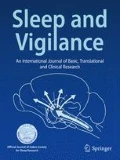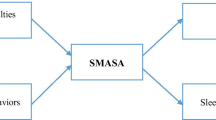Abstract
Objective
The main objective of the present study was to investigate the association of risk factors on sleep quality of Bangladeshi university students.
Method
A total of 332 students participated in a cross-sectional structured interview study.
Result
Utilizing the Pittsburgh Sleep Quality Index, the overall prevalence of poor sleep quality among the students was 66.6%, and the prevalence was higher among the female students (81.4%). Females had a 4.1 times higher risk of having poor sleep quality (AOR = 4.12, 95% CI 2.15–7.86, p < .001). Students who usually slept less than 7 h at night had 8.4 times higher risk of being a poor sleeper (AOR = 8.41, 95% CI 4.42–16.01, p < .001) compared to those who slept 7 h or more at night. Duration of bedtime social media use was highly associated with poor sleep quality. Those who used social media 1 h or more before bedtime were 4.3 times more likely to have poor sleep quality compared to those who did not use social media at all before bedtime (AOR = 4.33, 95% CI 1.38–13.51, p = .012).
Conclusion
Prevalence of poor sleep quality was found very high among the Bangladeshi university students. Being female, having less sleep a night, and spending more than an hour using social media before sleep were independent predictors of poor sleep quality.
Similar content being viewed by others
Data Availability
After considering all aspects of ethical issue and as per existing rule, anonymized data may be shared with qualified researchers.
References
Ferri R, Manconi M, Plazzi G, Bruni O, Vandi S, Montagna P, et al. A quantitative statistical analysis of the submentalis muscle EMG amplitude during sleep in normal controls and patients with REM sleep behavior disorder. J Sleep Res. 2008;17:89–100.
Jin W, Wang A, Ma J, Lin Q. Effects of electromagnetic induction and noise on the regulation of sleep wake cycle. Sci China Technol Sci. 2019;62:2113–9.
Short MA, Louca M. Sleep deprivation leads to mood deficits in healthy adolescents. Sleep Med. 2015;16:987–93.
Bin YS. Is sleep quality more important than sleep duration for public health? Sleep. 2016;39:1629–30.
Lee SY, Ju YJ, Lee JE, Kim YT, Hong SC, Choi YJ, et al. Factors associated with poor sleep quality in the Korean general population: Providing information from the Korean version of the Pittsburgh Sleep Quality Index. J Affect Disord. 2020;271:49–58.
Kline C. Sleep Quality. Encycl Behav Med. New York: Springer; 2013. p. 1811–1813.
Porth C. Essentials of pathophysiology: Concepts of altered health states. 8th ed. New York: Wolters Kluwer Health Lippincott Williams & Wilkins; 2009.
Berhanu H, Mossie A, Tadesse S, Geleta D. Prevalence and associated factors of sleep quality among adults in Jimma town, southwest Ethiopia: A community-based cross-sectional study. Sleep Disord. 2018;2018:1–10.
Hale L. Who has time to sleep? J Public Health (Bangkok). 2005;27:205–11.
Stranges S, Dorn JM, Shipley MJ, Kandala N-B, Trevisan M, Miller MA, et al. Correlates of short and long sleep duration: a cross-cultural comparison between the United Kingdom and the United States: The Whitehall II Study and the Western New York Health Study. Am J Epidemiol. 2008;168:1353–64.
Yunus FM, Khan S, Akter T, Jhohura FT, Reja S, Islam A, et al. How many hours do people sleep in Bangladesh? A country-representative survey. J Sleep Res. 2016;25:365–76.
National Sleep Foundation. National Sleep Foundation Recommends New Sleep Times [Internet]. 2020 [cited 2020 Jul 27]. https://www.sleepfoundation.org/press-release/national-sleep-foundation-recommendsnew-%0Asleep-times
Medic G, Wille M, Hemels M. Short- and long-term health consequences of sleep disruption. Nat Sci Sleep. 2017;9:151–61.
Yunus FM, Khan S, Mitra DK, Mistry SK, Afsana K, Rahman M. Relationship of sleep pattern and snoring with chronic disease: Findings from a nationwide population-based survey. Sleep Heal. 2018;4:40–8.
Grandner MA, Patel NP, Gehrman PR, Xie D, Sha D, Weaver T, et al. Who gets the best sleep? Ethnic and socioeconomic factors related to sleep complaints. Sleep Med. 2010;11:470–8.
Buboltz WC, Brown F, Soper B. Sleep habits and patterns of college students: A preliminary study. J Am Coll Heal. 2001;50:131–5.
Lund HG, Reider BD, Whiting AB, Prichard JR. Sleep patterns and predictors of disturbed sleep in a large population of college students. J Adolesc Heal. 2010;46:124–32.
Oswalt SB, Wyatt TJ. Who needs more sleep? Comparing undergraduate and graduate students’ sleep habits in a National U.S. sample. Int J High Educ. 2014;4:77–85.
Jahan SM, Hossain SR, Sayeed UB, Wahab A, Rahman T, Hossain A. Association between internet addiction and sleep quality among students: A cross-sectional study in Bangladesh. Sleep Biol Rhythms. 2019;17:323–9.
Ahmed M, Sen L, Griffiths M. Association between self-rated health and quality of life with sleep quality among Bangladeshi university students. Soc Heal Behav. 2020;3:35–7.
Islam MA, Hossin MZ. Prevalence and risk factors of problematic internet use and the associated psychological distress among graduate students of Bangladesh. Asian J Gambl Issues Public Heal. 2016;6:11.
Mamun MA, Rafi MA, Al Mamun AHMS, Hasan MZ, Akter K, Hsan K, et al. Prevalence and psychiatric risk factors of excessive internet use among northern Bangladeshi job-seeking graduate students: A pilot study. Int J Ment Health Addict. 2019;1–11.
Reynolds AM, Shell MD. 0726 The impact of sleep on GPA and internalizing symptoms in college students. Sleep. 2018;41:A269–A270270.
Hershner S, Chervin R. Causes and consequences of sleepiness among college students. Nat Sci Sleep. 2014;6:73–84.
Levenson JC, Shensa A, Sidani JE, Colditz JB, Primack BA. The association between social media use and sleep disturbance among young adults. Prev Med (Baltim). 2016;85:36–41.
Mwape RK, Mulenga D. Consumption of energy drinks and their effects on sleep quality among students at the copperbelt university school of medicine in Zambia. Sleep Disord. 2019;2019:1–7.
Ghrouz AK, Noohu MM, Dilshad Manzar M, Warren Spence D, BaHammam AS, Pandi-Perumal SR. Physical activity and sleep quality in relation to mental health among college students. Sleep Breath. 2019;23:627–34.
Buysse DJ, Reynolds CF, Monk TH, Berman SR, Kupfer DJ. The Pittsburgh sleep quality index: A new instrument for psychiatric practice and research. Psychiatry Res. 1989;28:193–21313.
Almojali AI, Almalki SA, Alothman AS, Masuadi EM, Alaqeel MK. The prevalence and association of stress with sleep quality among medical students. J Epidemiol Glob Health. 2017;7:169.
Taber KS. The use of Cronbach’s alpha when developing and reporting research instruments in science education. Res Sci Educ. 2018;48:1273–96.
Bland JM, Altman DG. Statistics notes: Cronbach’s alpha. BMJ. 1997;314:572–572.
Afandi O, Hawi H, Mohammed L, Salim F, Hameed AK, Shaikh RB, et al. Sleep quality among university students: Evaluating the impact of smoking, social media use, and energy drink consumption on sleep quality and anxiety. Inq J. 2013;5.
Kronholm E, Harma M, Hublin C, Aro AR, Partonen T. Self-reported sleep duration in Finnish general population. J Sleep Res. 2006;15:276–90.
Ak Ş, Koruklu N, Yılmaz Y. A study on Turkish adolescent’s internet use: Possible predictors of internet addiction. Cyberpsychology, Behav Soc Netw. 2013;16:205–9.
Sehgal A, Mignot E. Genetics of sleep and sleep disorders. Cell. 2011;146:194–207.
Al-Khani AM, Sarhandi MI, Zaghloul MS, Ewid M, Saquib N. A cross-sectional survey on sleep quality, mental health, and academic performance among medical students in Saudi Arabia. BMC Res Notes. 2019;12:665.
Alsaggaf M, Wali S, Merdad R, Merdad L. Sleep quantity, quality, and insomnia symptoms of medical students during clinical years: Relationship with stress and academic performance. Saudi Med J. 2016;37:173–82.
Al-Kandari S, Alsalem A, Al-Mutairi S, Al-Lumai D, Dawoud A, Moussa M. Association between sleep hygiene awareness and practice with sleep quality among Kuwait University students. Sleep Heal. 2017;3:342–7.
Dietrich SK, Francis-Jimenez CM, Knibbs MD, Umali IL, Truglio-Londrigan M. Effectiveness of sleep education programs to improve sleep hygiene and/or sleep quality in college students. JBI Database Syst Rev Implement Rep. 2016;14:108–34.
Tavernier R, Willoughby T. Sleep problems: Predictor or outcome of media use among emerging adults at university? J Sleep Res. 2014;23:389–96.
Garett R, Liu S, Young SD. The relationship between social media use and sleep quality among undergraduate students. Inform Commun Soc. 2018;21:163–73.
Dhaka Tribune. 4.1% growth in local mobile phone market in 2019 | Dhaka Tribune [Internet]. [cited 2020 Jul 27]. https://www.dhakatribune.com/business/2020/02/24/4-1-growth-in-local-mobile-phone-market-in-2019
Harvard Medical School. Blue light has a dark side—Harvard Health [Internet]. [cited 2020 Jul 27]. https://www.health.harvard.edu/staying-healthy/blue-light-has-a-dark-side
Oche OM, Gana GJ, Yahaya M, Khalid I, Sambo MLA. Prevalence and effect of social media on sleep among students of higher institutions in Sokoto Metropolis, Sokoto State Nigeria. Ann Med Health Sci Res. 2019;9:729–35.
Poorolajal J, Ahmadpoor J, Mohammadi Y, Soltanian AR, Asghari SZ, Mazloumi E. Prevalence of problematic internet use disorder and associated risk factors and complications among Iranian university students: A national survey. Heal Promot Perspect. 2019;9:207–13.
Andreassen CS, Pallesen S, Griffiths MD. The relationship between addictive use of social media, narcissism, and self-esteem: Findings from a large national survey. Addict Behav. 2017;64:287–93.
Uddin MS, Mamun A Al, Iqbal MA, Nasrullah M, Asaduzzaman M, Sarwar MS, et al. Internet addiction disorder and its pathogenicity to psychological distress and depression among university students: A cross-sectional pilot study in Bangladesh. Psychology. 2016;07:1126–37.
Karim AKMR, Nigar N. The Internet Addiction Test: Assessing its psychometric properties in Bangladeshi culture. Asian J Psychiatr. 2014;10:75–83.
Funding
The authors did not receive any external source of funding for this study.
Author information
Authors and Affiliations
Contributions
MSA: conceptualization, data curation, formal analysis, writing—original draft, Validation. SK: writing—original draft, validation, KH: writing—original draft, validation, LCS: writing—review and editing, validation, FMY: conceptualization, data analysis, writing—review and editing, validation, MDG: writing—review and editing, validation.
Corresponding author
Ethics declarations
Conflict of interest
The authors declare that they have no conflict of interests.
Ethical approval
Study protocol was approved by the Institutional Ethical Committee (IEC) of Patuakhali Science and Technology University, Patuakhali, Bangladesh (reference no. PSTU/IEC/2019/03; Date: 10-07-2019).
Informed consent
Written informed consent and assent were obtained from both the participants and their respective parents.
Consent for publication
All authors have read and approved the submission.
Additional information
Publisher's Note
Springer Nature remains neutral with regard to jurisdictional claims in published maps and institutional affiliations.
Electronic supplementary material
Below is the link to the electronic supplementary material.
Rights and permissions
About this article
Cite this article
Ahmed, M.S., Khan, S., Hsan, K. et al. Factors Affecting Sleep Quality Among the University Students in Bangladesh: A Cross-Sectional Structured Interview Study. Sleep Vigilance 4, 177–184 (2020). https://doi.org/10.1007/s41782-020-00106-4
Received:
Revised:
Accepted:
Published:
Issue Date:
DOI: https://doi.org/10.1007/s41782-020-00106-4




